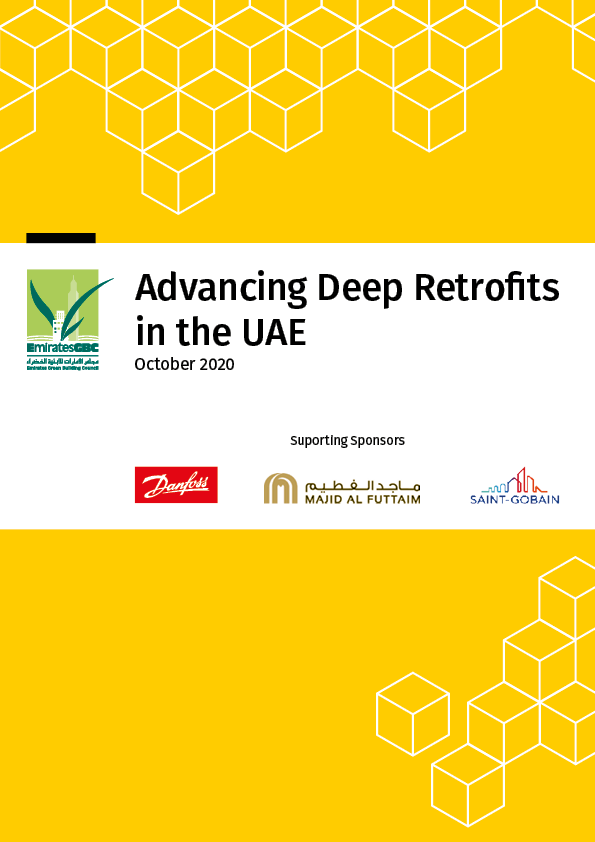- 70% of building industry stakeholders say technology for deep retrofit is already available in the market
- 60% highlighted greater need for technical knowledge and experience for deep retrofits
- Majority of ESCOs, consultants, suppliers and manufacturers say building retrofits must be made mandatory
- Study supported by Danfoss, Majid Al Futtaim and Saint-Gobain
Emirates Green Building Council (EmiratesGBC), an independent forum aimed at conserving the environment by strengthening and promoting green building practices, today unveiled the results of its study ‘Advancing Deep Retrofits in the UAE’ at the virtual EmiratesGBC webinar. According to the study, a majority (84 per cent) of the respondents, including consultants, suppliers, manufacturers and ESCO experts, agree that more than 50 per cent energy savings are possible in the UAE through deep retrofit.
The study was conducted to understand the current UAE retrofit market awareness and capabilities, as well as the challenges and opportunities related to deep building retrofit projects. It aims to support the industry and government to explore solutions, approaches and incentives to retrofitting buildings that go beyond current renovation programmes to achieve greater energy and financial savings. It showcases the viewpoints of the key stakeholders in the UAE retrofit market to support in the development of national and emirate level roadmaps to deep retrofits and decarbonisation of the existing building stock.
His Excellency Ali Al Jassim, Chairman of EmiratesGBC, said: “The EmiratesGBC ‘Advancing Deep Retrofits in the UAE’ study highlights the current situation of the UAE’s retrofit market. We believe that achieving deep retrofits can be executed by implementing energy efficiency measures before the addition of on-site renewable energy generation. We are committed to supporting the UAE’s goals for a greener future, with the nation being among the first to announce its commitment to the ‘Zero Carbon Buildings for All’ initiative, a multi-partner global initiative led by the World Resources Institute and endorsed by the UN Secretary General. Deep Retrofit plays a major role making this commitment a reality.”
He added: “The long-term value of deep retrofit, which aims for 50 per cent on-site energy use reduction, outpaces the initial costs where done effectively. The challenge today is not as much in project financing but on the need for industry stakeholders to go further into retrofitting and not look at just the easier tasks – such as lighting. That is why it is important to look at deep retrofitting to achieve the net zero goals.”
In key findings, the EmiratesGBC Deep Retrofits study observes there is no common standard used for reporting energy savings in the market, with some retrofit projects including renewable energy generation as part of the reported energy savings. This also prompts respondents to call for building retrofits to be made mandatory by the government. From the developers’ perspective, 45 per cent believe the retrofit market can be further accelerated by mandating energy and water performance certificates for existing buildings. If retrofits are mandated, 64 per cent of the developers would prefer an annual reduction target (in kilowatt-hour) between 11 to 20 per cent. Highlighting the opportunity to execute deep retrofit in the UAE effortlessly, 70 per cent of building industry stakeholders say technology for deep retrofit is already available in the market, while 60 per cent observed there is a greater need for technical knowledge and experience for deep retrofits to be delivered successfully in the UAE.
The challenges highlighted by the respondents include lack of landlord interest and financial incentives, low tariff rates, high capital investments, and lack of government initiatives. Majority of the respondents highlighted the need for benefits such as linking building performance to rental costs, dynamic tariffs rates to promote higher building efficiency, green loans or lower interest rates, tax-rebates and grants for energy efficiency-related projects.
The report, which can be downloaded for free on the EmiratesGBC website, was developed with the support of Danfoss, Majid Al Futtaim and Saint-Gobain. The report includes responses from high profile government employees, building owners and developers, private consultants, individuals from energy service companies, suppliers, manufacturers, construction professionals as well as engineers. The study consisted of various stages including research, literature review, market survey from all sectors of the UAE retrofit market and a developer’s survey for the UAE developers only to capture their views and opinions.
In order to create impact about the benefits of Deep Retrofit, EmiratesGBC had earlier introduced a first-of-its-kind Building Retrofit Training programme in the region. Carefully crafted to address region-specific requirements outlining actionable steps to help stakeholders achieve sustainable building practices, EmiratesGBC has also partnered with the entities such as the Dubai Supreme Council of Energy and Masdar for the programme.
EmiratesGBC conducts various technical studies and trainings to understand the green building market sentiment and to further push the green buildings in the UAE and MENA region.
